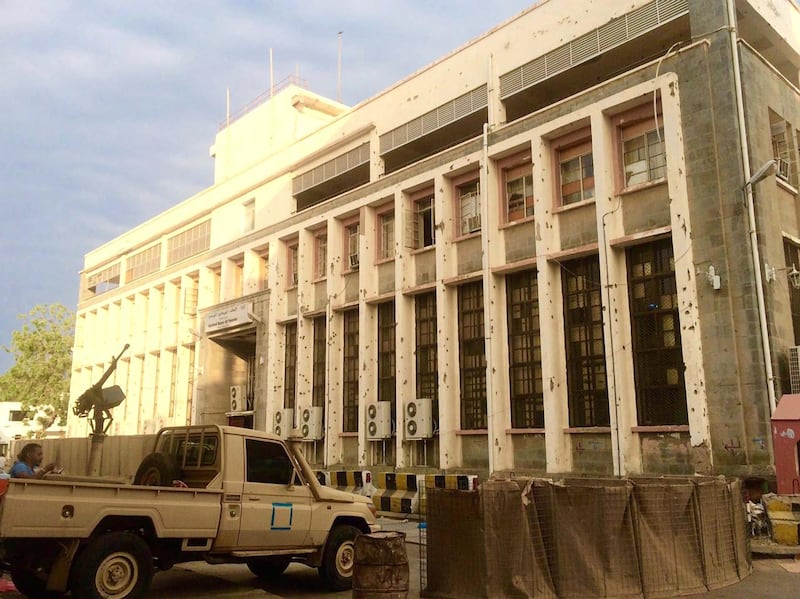Security threats and logistical difficulties pose major challenges to Yemen's plan to establish a financial hub in the southern port city of Aden, but the move is a positive step towards reviving its crippled economy, analysts say.
Yemen's central bank will begin preparations for the Aden Financial Centre (AFC) to strengthen the country's banking system and institutions, state-news agency Saba reported last week, citing central bank governor Mohammed Zammam’s statements after his visit to Saudi Arabia and Jordan. It will house the banking regulator's new headquarters, commercial banks, insurance companies and exchange firms.
"It is undeniable that there are many major security and logistical challenges following the decision to establish a financial centre in Aden in the current circumstances given the ongoing war," Maged Al-Daeri, an Aden-based economic analyst and an employee at The Credit and Agricultural Bank, told The National.
"It will be beneficial for Yemen and the region if the centre is established and gets the region's blessings, international support, as it could be a major boost to the economy and revival of Aden's ports given the city's strategic location from Bab Al Mandab," Mr Al-Daeri said, referring to the strategic Red Sea shipping lane.
The Arab world's poorest country, caught in the grip of a four-year civil war following a coup d’etat by the Houthi movement in Sana’a, is plagued by a humanitarian crisis and a dysfunctional economy. The central bank is split into two rival head offices in Aden and Sana'a, after several state entities fell into disarray following the 2014 Houthi coup. The regulator faces a tall order as it scrambles to revive the Yemeni riyal, which has lost two-thirds of its value since 2015 and exacerbated unemployment, while financing food imports needed to fend off a widespread famine. It is also struggling to pay public sector wages.
______________
Read more:
[ UN: Houthi rebels withdraw from Hodeidah port under ceasefire deal ]
[ Yemen government to pay civil servants in rebel-held Hodeidah ]
______________
Setting up a financial hub in Aden is challenging "if you look at the security situation … and the absence of a stock exchange in Yemen," Saleh Aljefri, an independent Aden-based economist, said.
Analysts also point out the challenges in sourcing the funding and allocating appropriate infrastructure to embark on such a major project, but highlighted its benefits to the economy once its established.
The financial centre in Aden is meant to serve as a base for the Yemeni central bank, a secure location for money deposits and residential quarters for bank employees. It would also house the headquarters of local commercial and government banks and become home to the regulatory authority of a long-planned stock exchange in Yemen, which does not have a bourse.
Setting up a financial hub in Aden will strengthen the role of the Central Bank as the country's banks and financial institutions gather under one roof, helping to empower the central bank and revive the economy, Mr Aljefri said.
The International Monetary Fund has recommended that Yemen "reverse the fragmentation in the central banking system", Kareem Ismail, resident representative for Yemen at the IMF, said to The National. "In our view [reducing fragmentation] would facilitate the pooling of revenues and paying civil servant salaries throughout the country."
But the main priorities to resuscitate Yemen's economy in 2019 will be effective only once peace is restored, Mr Ismail said.
“At this stage, it seems premature to change the legal arrangements for the location and structure of the central bank; this should be part of a post-conflict settlement that ensures that an independent and effective central bank can resume providing price and financial stability for the whole of Yemen.”
The key priorities on Yemen's economic agenda this year will be to unlock the nation's resources by reviving the oil and gas sector and resuming the oil exploration efforts halted by the war, Mr Aljefri said.
Yemen has the smallest oil reserves on the Arabian Peninsula and accounts for 0.2 per cent of the world’s total reserves. The country’s production, which was 341,000 barrels per day in 2007 has steadily declined, falling 19.7 per cent between 2006 and 2017 and averaged 52,000 bpd at the end of 2017, according to BP’s Statistical Review of World Energy.
However, oil exports have picked up since and in August, the country exported a 500,000 barrel cargo from its southern Shabwa province. The shipment, the first since conflict erupted in Yemen in 2015 was offered via open tender and bound for China.
Yemen is awaiting $3 billion in deposits from foreign sources to prop up its economy, which analysts say should come no later than the first quarter of 2019, to avoid another collapse in the currency.






